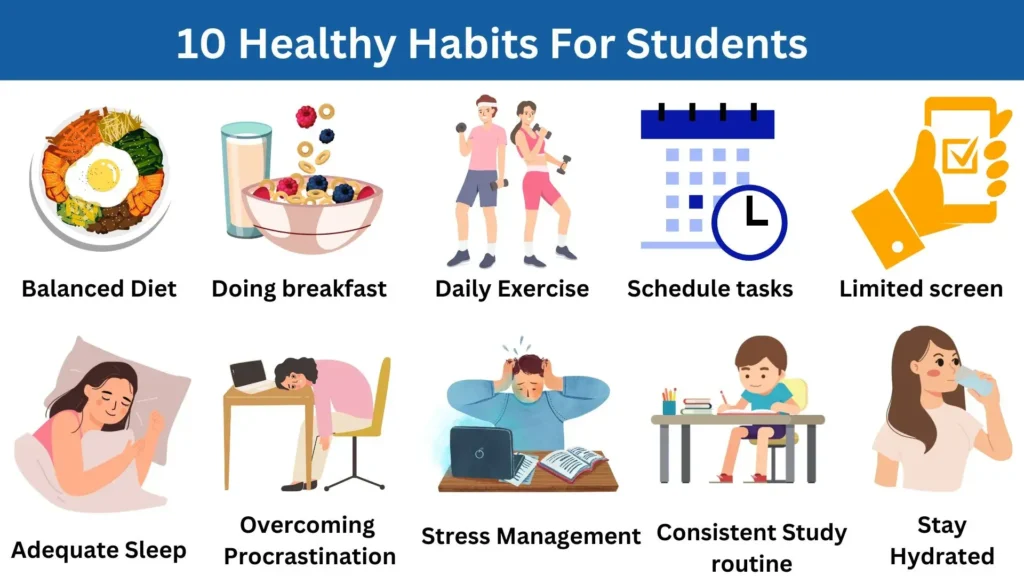You must have encountered the famous universally acclaimed proverb ‘Health is wealth.’ Healthy habits for students are essential for their health and academic performance.
People do a lot of stuff to stay healthy. They work out, go on a walk, eat healthy, and organize their routines in a healthy manner. Like every other person on earth, students also need to be healthy.
While pursuing good grades often consumes students’ time and energy, neglecting healthy habits can have serious consequences.
This blog will provide a guide to 10 healthy habits for students. By adopting these habits, you can perform well academically and need not worry about your health anymore.
Table of Contents
10 Healthy Habits for Students
Do you know how to stay healthy in college or school? Well, staying fit is surely less complicated than mastering academic subjects. You have to add some healthy habits to your lifestyle.
If you are a student, include the following list of 10 healthy student habits in your routine. With this, you get a more active and engaging brain to assist you in your studies.

1. Balanced Diet
A balanced diet acts as a foundation for a healthy lifestyle and sets students on the path to academic success.
Getting a balanced diet is one of the healthy habits for students. To fuel your body and brain, try to eat various nutritious foods, including fruits, vegetables, lean proteins, and whole grains.
If you have three meals daily, have some salad or fruit at noon. Also, home-cooked meals are healthier than restaurant foods. If you live with your family, then do eat home-cooked meals. If you live alone, cook for yourself. Eat in a balanced and wise way.
2. Doing Breakfast
There is a reason why having breakfast is called one of the most essential healthy habits for students. As evident from the name breakfast, it breaks the overnight fasting period.
You may only have eaten something overnight for up to 12 hours, but breakfast refills the lost energy and boosts your energy level and alertness.
Also, many studies have observed that students who eat breakfast regularly tend to perform better academically compared to those who skip it. So, no matter how busy you are, make sure to eat breakfast.
3. Regular Exercise
Physical activity is very significant in keeping the body and mind healthy. Don’t just stick to your laptops or other devices, and don’t spend your holidays lounging on the couch.
Incorporating physical activities is among the important healthy habits for students. It boosts their energy levels, improves mood, and enhances cognitive function.
Students can learn how to build exercise habits to implement them in their lives.
4. Schedule Your Tasks
To be productive and effective, you need to schedule your daily tasks. A schedule is a roadmap that helps you plan your day and ensure you have enough time to complete your tasks. This scheduling relaxes you.
Scheduling daily tasks is a healthy habit for students in school and college. A structured schedule encourages students to balance academic and personal wellbeing.
There are many task management apps like Todoist, Google Calendar, Microsoft to Do, and many more that can help students stay organized.
Students can also use the notion to track their daily planning habits.
5. Limited Screen Time
In today’s connected world, we are always on our phones, connected on Facebook, Instagram, and TikTok. Spending too much time on screen is one of the bad habits of teenagers.
Limiting screen time is easier said than done. However, limiting screen time is a good habit for college and school students. Once you start managing your screen time, you can improve your sleep schedule, focus better, and increase academic success.
6. Adequate Sleep
Adequate sleep is one of the healthy habits for students. According to a Mayo Clinic article, the amount of sleep a person needs depends on various factors. One important is the age of a person.
| Age | Sleep |
|---|---|
| 13 to 18 years | 9 to 12 hours daily |
| Adults ( 18 years above) | 7 or more hours daily |
So, aiming for 7 to 9 hours of sleep is a healthy habit for school and college students. Adequate sleep supports their cognitive function and memory consolidation, including overall health.
7. Overcoming Procrastination
If you procrastinate, don’t panic, as it’s natural for a student to procrastinate. Don’t panic. You can overcome procrastination.
- Students can overcome procrastination by:
- Setting realistic goals
- Setting deadlines for yourself
- Starting with a tiny step
- Changing their circumstances resisting them from completing tasks
You can increase productivity and motivation, reduce stress, and improve mental health.
8. Stress Management
Encountering stress during student life is an inevitable fact. At any moment of your academic life, you do meet stress. This can be due to many reasons. Always be aware of the stress triggers and try to eliminate them.
Stress management is among 10 healthy habits for students. There are several stress management techniques like:
- Adequate sleep
- Exercise
- Listening to music
- Guided imagery
- Building support network
- Eating healthy diet
These techniques help students to minimize stress and regulate their active participation.
9. Consistent Study Routine
A consistent study routine is a cornerstone for achieving academic success. Studying regularly improves memory, and students can allocate their time effectively.
A consistent study routine is one of the healthy habits for students. Rather than having the stress of covering more extensive material, they can tackle small portions regularly, leading to a manageable workload.
Consistent and good study routines have important benefits for school and college students.
10. Stay Hydrated
How to stay healthy in school and college? The answer is simple: stay hydrated. Hydration is the key element in life support; regularly drinking water can improve brain function, prevent headaches and fatigue, and replenish energy levels.
Keeping themselves hydrated before symptoms of dehydration is a common healthy habit for students.
Even mild dehydration can affect memory, mood, and concentration. Adding a few glasses of water into your daily routine can improve your cognition and focus, stabilize your emotions, and help you combat stress and anxiety.
Good Habits for Students in School
Following are some of the good habits for students in schools:
I. Active Participation
Active participation is a healthy and good habit for students in schools because it helps in deeper learning, boosts confidence, and polishes critical thinking skills. This equips students to succeed academically and develop lifelong skills.
II. Maintain Social Interactions
Social connections prove to be a contributing factor to better health and longevity. As we are social animals, social connections are important for our survival.
School and college students maintain social interactions to reduce feelings of isolation and promote emotional wellbeing.
III. Consistent Study Routine
A consistent study routine is a cornerstone for achieving academic success. Regular study improves memory, and students can allocate their time effectively.
A consistent study routine is a healthy habit for students. Rather than having the stress of covering larger material, they can tackle small portions regularly, leading to a manageable workload.
IV. Limiting Distractions
Students can create an environment conducive to active learning by cultivating a habit of limiting distractions.
By doing this, students can accomplish more tasks in less time, enhancing their productivity.
V. Review and Revise
Reviewing and revising material are healthy habits of students. These help students consolidate knowledge.
Going through the course several times helps create a more profound understanding and reveals new insights. Regular reviewing also helps in better exam preparation.
Tips for How to Stay Healthy in College
It’s normal for a college or university student to face slight health issues. The following are some tips for staying healthy in college.
I. Always Watch What You are Eating
Be strict with yourself regarding what to eat. Have a balanced diet, integrating some healthy foods like fruits and veggies.
Similarly, there are several effects of anger on your eating habits. It is better to avoid anger-induced eating.
II. Engage Yourself in some Physical Activity
Don’t be a sloth. Give yourself some time and maintain your health. To facilitate your brain function and improve your focus, take some time for a jog or a run, at least walk some miles, and try to work out daily.
III. Keep your Study Space Organized and up to the Mark
To reduce stress and pressure, organize your study space. You can use some indoor plants for peace and serenity. You can decorate it with things of your interest.
This will make studying exciting and make you feel better mentally. The tidiness will surely improve your productivity.
IV. Limit Sugary Beverages and Caffeinated Drinks
Sugary drinks have high calories and contribute to weight gain. Limiting sugar beverages is one of the healthy habits for students.
By limiting these drinks, you can prevent weight gain too. Opting for beverages that don’t contain caffeine or added sugars can help students maintain more stable energy levels throughout the day.
V. Always Get Enough Sleep
Getting proper sleep is a secret to staying healthy in college. For better focus and increased energy level, resist sleeping late.
Make your schedule in such a way that you get at least 7 hours of sleep. A healthy sleeping pattern will be a source of better academic performance and reduce stress.
Good Habits for Students in College
If you opt for the following healthy habits for students in college, you will prosper academically, and these will help in your future professional career too. Let’s take a look at these:
I. Organization
Organizational skills are the gateway to academic success. Once you start managing and organizing your tasks, you become less concerned about deadlines; you get more free time.
The organization will help to minimize stress. This improves focus and productivity and will also help you post-graduation in your professional life.
II. Effective Note Taking
Note-taking has many benefits. Taking notes while listening to lectures in class can help you better focus and understand main concepts. After class, you can review your notes to study efficiently for exams. Also, note-taking enhances retention and active listening.
III. Financial Planning
Financial planning will help you in various ways. It is one of the important healthy habits for students. This will help you with budgeting skills like creating and sticking to a budget.
Learning to manage finances independently is an important step towards adulthood and financial independence. Financial planning empowers students to take control of their financial future and make informed decisions about money management.
IV. Group Study
Group study is a beneficial habit for college students because it helps discuss various complex topics, includes many perspectives, engages in active learning, and promotes collaboration, motivation, accountability, and social interaction.
So, to get a richer learning experience and improved academic performance, be a part of group study and take it seriously.
V. Setting Clear Goals
Always be clear about your aspirations. Once you are clear about your direction, it will motivate you and create a sense of accomplishment.
By setting and pursuing meaningful goals, you can know your potential, which will lay the foundation for a rewarding future.
Conclusion
Adopting healthy habits for students is necessary to perform well academically and for their wellbeing. Prioritizing habits such as a balanced diet, regular exercise, adequate sleep, and stress management lays a foundation for success. In addition, other good habits for college students, like staying organized, practicing effective note-taking, financial planning, group study, and setting clear goals, play a significant part in academic and practical life. By integrating these habits into their lifestyle, students can thrive academically and cultivate lifelong skills for success.
FAQs
How can we inspire students to cultivate healthy habits?
We can inspire students to develop healthy habits in several ways. Following are some practical tips:
I. By explaining food items to them so they can make informed food choices, we can inspire them to lead a healthy life.
II. By incorporating physical activity in their routines. Taking them on walks and giving them breaks for stretching and moving.
III. By promoting a calm sleep routine by turning off their devices an hour before their sleep.
Parents and teachers can get help from these tips to cultivate healthy student habits.
What are some good habits for students to practice before sleep, and why?
Experts usually advise not to use electronic devices before going to sleep, which promotes utilizing brain function by learning something important before going to sleep. Using this strategy is a healthy habit for students, especially during exams. Maintain the journal, write at least three things you are grateful about, and stay hydrated. These habits are productive because they signal the brain that it’s time to wind down and sleep. These improve the overall sleep quality of students.




